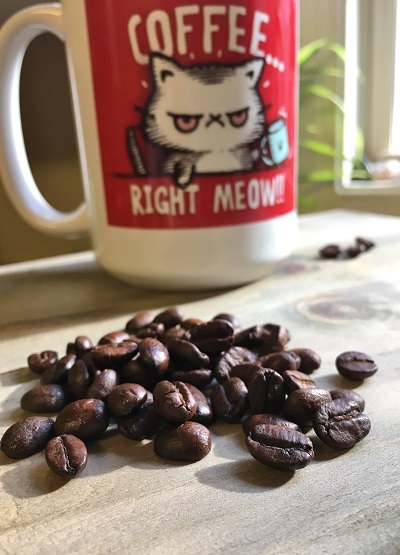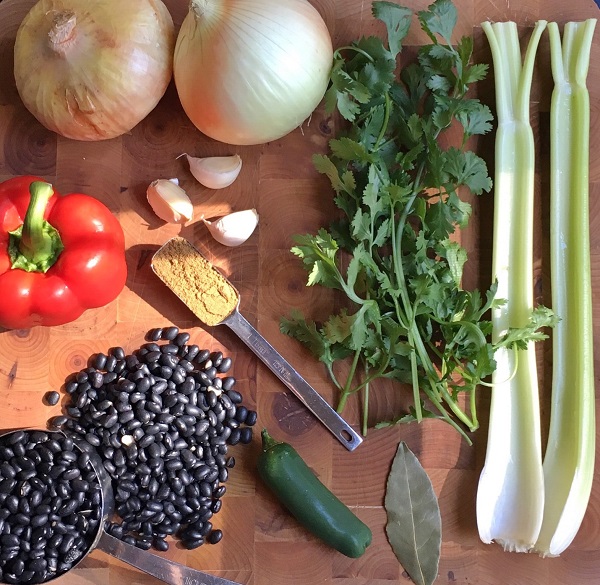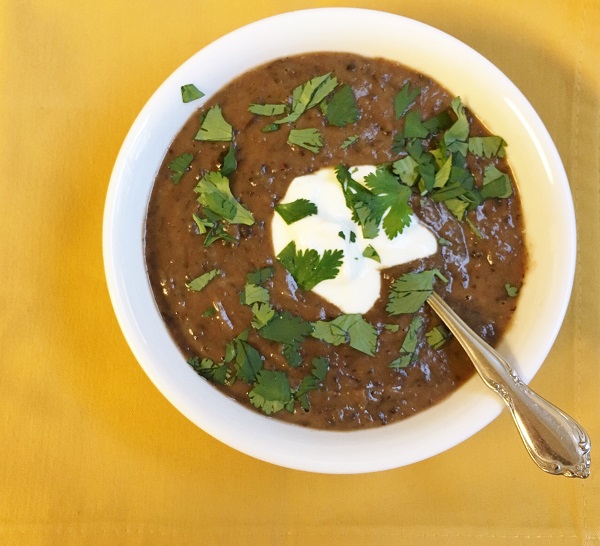Ok, let’s just get this out of the way first. I love coffee! I mean, I LOOOVE coffee! The smell, the taste, the morning ritual, I love it all! Now, having said that, my goal for this blog is to be as unbiased as possible, and to provide the facts and the research (plus a delicious coffee infused recipe at the end). 🙂
I’m not alone with my love for coffee. In the U.S. we drink over 400 million cups per day and spend $30 billion on it each year! This tasty beverage has been enjoyed for centuries by cultures all over the world. Coffee is also a major source of polyphenols (powerful antioxidants) in the American diet (however, your goal should be for fruits, vegetables and other plant foods to be your top sources of antioxidants).
If you’ve been paying attention to news headlines it can be very confusing to figure out if coffee is healthy or detrimental to our health. One day it’s great, the next day it’s deadly! One of the reasons for the conflicting research results is that we are all different. Genetically, we respond differently to caffeine (and so to coffee), see this blog for more information on nutrigenomics.
Are You a Slow or Fast Caffeine Metabolizer?
Caffeine is metabolized in the liver by an enzyme encoded by the CYP1A2 gene. This gene accounts for about 95% of caffeine metabolism. One variant of the gene causes the liver to metabolize caffeine slowly, another variant causes the liver to metabolize caffeine quickly. Then there is a third variant that is in the middle.
The slower you metabolize caffeine, the longer it stays in the blood and the stronger effect it has. Typically, if you are a slow metabolizer you might feel the effects of caffeine longer, or you may feel like you can’t tolerate caffeine at all. This enzyme is one of many cytochrome P450 enzymes. Cytochrome P450 enzymes are used as part of our bodies natural detox process to break down toxic compounds including medications. This is why certain medications can impact how your body metabolizes caffeine and vice versa. For example, hormonal contraceptives have been shown to reduce caffeine metabolism, while nicotine increases caffeine metabolism.
Unfortunately, if you are a slow caffeine metabolizer, and you tend to drink a lot of coffee, this is where we see most of the negative effects of coffee including:
- increased risk of hypertension
- increased risk of heart attack
- impaired fasting glucose.
However, in some cases it does appear that coffee can be beneficial even for slow metabolizers. They still get neuroprotective aspects and reduced risk of Parkinson’s. And keep in mind that the negative effects for slow metabolizers is typically only with high caffeine consumption. Most research shows that slow metabolizers can have about a cup or two per day with no harmful effects (unless you are very sensitive to caffeine).
(To find out if you are a slow or fast metabolizer you would have to get your genetics tested. There are many companies that do this now and can vary greatly with price, number of genes tested, and level of interpretation.)
Most of the research we have about coffee comes from epidemiological studies. In these studies researchers have found that consuming coffee:
- May reduce your risk of many cancers, including cancer of the breast, colorectal, prostate , and liver
- Is associated with lower rates of cognitive decline, Alzheimer’s, and Parkinson’s
- May lower your risk of diabetes (although it looks like decaf does this better)
- May lower your risk of heart disease and stroke, specifically decreasing oxidative stress, reducing inflammation, and improving endothelial function
- May improve cognitive function, working memory and mood
- May improve athletic performance (when consumed just prior to training)
Epidemiological studies look at patterns or averages among defined populations. They can tell us about associations, risk factors or correlations, but not causation. So this doesn’t account for individual differences.
Slow vs Fast Metabolizers
There have been studies done specifically looking at slow metabolizers vs. fast metabolizers. One NIH study of 4000 participants found that four or more cups of coffee per day was associated with a 36% increase of a heart attack. However, when they split the group into slow vs. fast metabolizers they found that the heavy coffee consumption only seemed to be linked to a higher likelihood of heart attacks in the slow metabolizers. The fast metabolizers showed a reduced risk of heart attacks for those who drank one to three cups of coffee daily.
Another study looked at hypertension in slow vs. fast metabolizers. Heavy and even moderate coffee drinkers were significantly more likely to have hypertension if they were slow metabolizers. But fast metabolizers saw their risk of hypertension fall as their coffee intake increased.
Our bodies are complex and complicated organisms. So, just by looking at one gene doesn’t always tell us exactly how you will react to coffee or caffeine. There are a huge number of factors besides the CYP1A2 gene that can influence how you are affected by coffee and caffeine (sleep, stress, gut microbiota, etc.), so pay attention to how you feel, perform, and sleep. Of course, if you experience heart palpitations, or feel jittery after drinking coffee, maybe decaf is a better option for you, regardless of your genes.
Other Considerations:
- Coffee and Sleep – We know that coffee has negative effects on sleep. It can impair melatonin secretion and throw off your circadian rhythm. Coffee can NOT replace sleep! If you are having any sleep issues (going to sleep, staying asleep, not feeling rested in the morning, etc.) I would urge you to at least do a trial of no caffeine for a month. Otherwise try to have your caffeine/coffee before noon.
- Coffee and Pregnancy – Caffeine does cross the placenta and many studies show harmful effects such as low birth weight, preterm labor, and increased childhood obesity. Currently, the guidelines are no more than 200mg of caffeine per day for pregnant women. Many providers urge patients to err on the safe side and just go for decaf while pregnant.
- Coffee and Stress- When you drink caffeine the body produces adrenaline- the same “fight or flight” response you get with stress, acute or chronic. When the adrenaline wears off you can be left feeling wiped out, moody, anxious and in need of more coffee! It can become a vicious cycle with the result being an over stressed and worn out adrenal system, and you with relentless fatigue, depression, joint and muscle pain and even chronic infections. If you are dealing with chronic stress (work, family, life!), overtraining, or are prone to anxiety, then limit your coffee intake to one to two cups per day to avoid this downward spiral.
What to Do
If you are unsure how coffee is affecting you, try going without it (and any other caffeinated beverages or foods) for 30 days, or at least switch to decaf. Slowly wean yourself off to avoid caffeine withdrawal symptoms (headaches being the most common). Pay attention to how you feel. Then start to add it back in slowly, and pay attention to how your body reacts. For most of us, sticking to one to two cups of coffee per day is the best way to get the benefits without the downsides.
Most importantly, when we are talking about the health effects of coffee, we’re mostly talking about caffeine and black coffee, not a caramel macchiato, Frappuccino or other super sugary “coffee drink.” Once you start adding sugar, artificial sweeteners, non-dairy creamers and other artificial stuff all bets are off!
Side Note: Coffee is one of the most contaminated crops worldwide so when possible buy organic! Fair Trade is another important consideration since most coffee beans are grown in developing nations where poor labor conditions, child labor and poor wages can be common. If the coffee is Fair Trade certified, this means that the farmers and workers that grew and harvested your coffee have acceptable working conditions (no child labor) and were paid a fair wage.
Smoky Black Bean Soup
Adapted from: Eating Well
Makes 6 Servings
The coffee adds a slightly toasty, woodsy background flavor.
Ingredients
1 pound dried black beans (2 cups)
2 tablespoons extra-virgin olive oil
2 medium onions, finely chopped
1 red bell pepper, finely chopped
2 large stalks celery, chopped
1 jalapeño pepper, seeded and finely chopped
3 large cloves garlic, minced
1 tablespoon ground cumin
4 cups water
2 cups brewed coffee (decaf)
1 ham hock (optional)
1 bay leaf
1 teaspoon salt, plus more if needed
plain Greek yogurt for garnish
Chopped fresh cilantro for garnish
Directions
- Pick over beans; rinse well. Place in a large bowl with cold water to cover by at least 2 inches. Let soak for at least 6 hours or overnight. Or use the quick-soak method: Cover the beans with 2 inches of water and bring to a boil; simmer 2 minutes. Remove from the heat and let stand, covered, for 1 hour. Drain.
- Heat oil in a Dutch oven over medium-high heat. Add the onions, bell pepper, celery, jalapeño and garlic and cook, stirring frequently, until the vegetables are beginning to brown, 5 to 8 minutes. Add cumin and cook, stirring, 1 minute more. Add the beans, water, coffee, ham hock (if using) and bay leaf; cover and bring to a boil, stirring occasionally. Reduce the heat, keep covered and simmer until the beans are very tender, about 1 1/2 hours. If using, remove the ham hock and set it aside to cool; remove the bay leaf. Stir in salt.
- Puree with an immersion blender in the pot until fairly smooth, or to desired consistency. If desired, cut meat off the ham hock, trim away any fat and chop the meat into small pieces; stir back into the soup.
- Serve the soup with a dollop of yogurt and cilantro, if desired.
Note: I have made this recipe with a ham hock and without. There is more flavor with the ham hock, but it is still very good without. If you are going to use a ham hock, I would highly encourage you to seek out one from a pasture raised pig, like from your local farmer or farmers market.
Nutrition Facts Per serving (without garnish): 330 calories, 6g fat, 410mg sodium, 54g carbohydrates, 14g fiber, 18g protein
Click here for a printer-friendly version of this blog post.
Click here for a printer-friendly version of this recipe.






